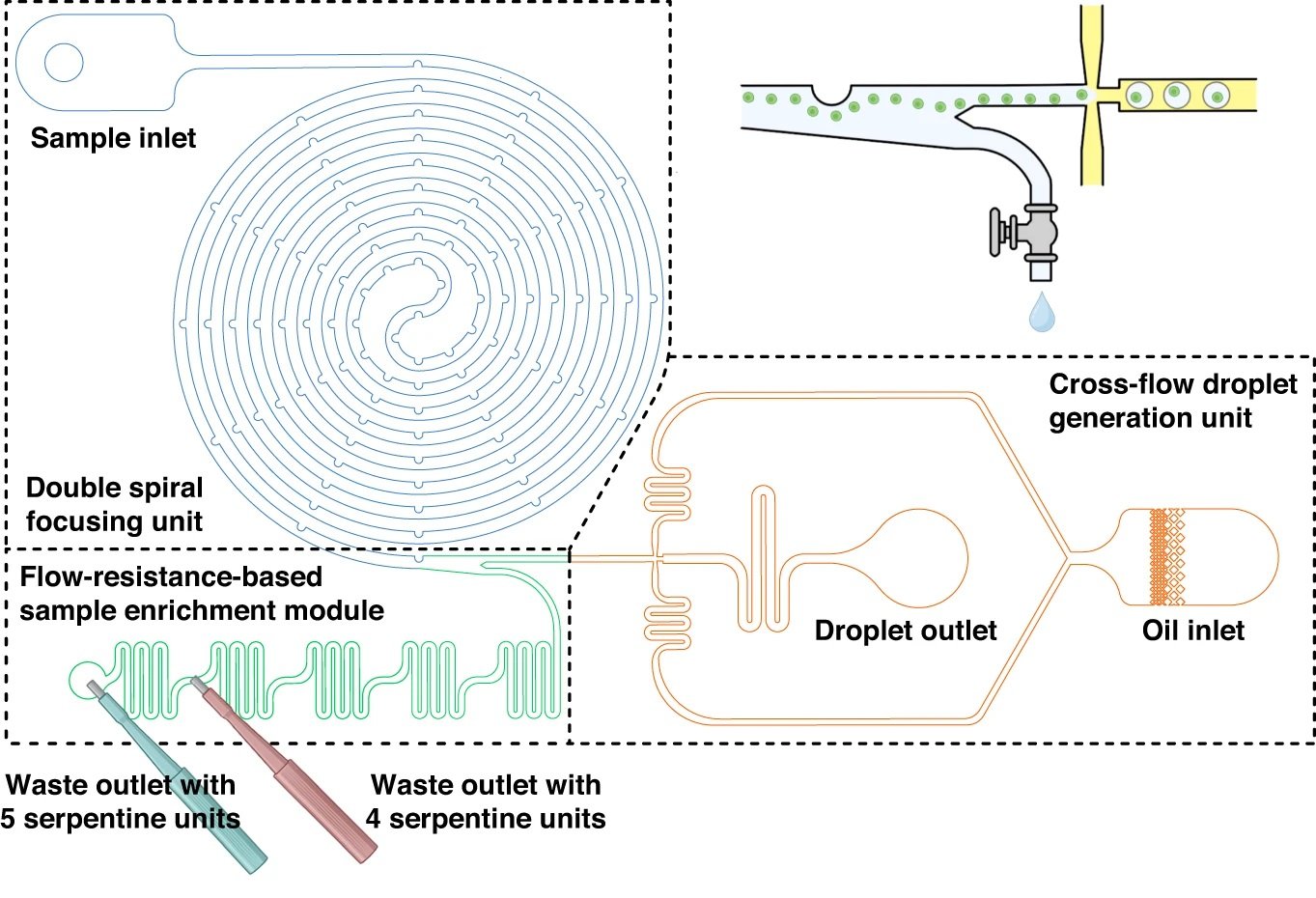
13 Jan Beyond Poisson Statistics: Enhancing Microfluidic Single-Cell Encapsulation
In the ever-evolving world of microfluidics, the study of single-cells has become a cornerstone for studying diseases and for therapeutic development. A recent paper published in the Microsystems and Nanoengineering journal “Enhancing Single-Cell Encapsulation in Droplet Microfluidics with Fine-Tunable On-Chip Sample Enrichment,” presents a study focused on improving single-cell encapsulation in droplet microfluidics. This encapsulation is often challenged by a trade-off between cell suspension density and on-chip focusing performance. The research introduces a novel droplet microfluidic chip that addresses this challenge.
“In this study, we introduce a novel droplet microfluidic chip to overcome this challenge. The chip comprises a double spiral focusing unit, a flow resistance-based sample enrichment module with fine-tunable outlets, and a crossflow droplet generation unit.“, the authors explained.

“The cell suspension is initially focused into a single line in the double spiral focusing unit. Excess aqueous phase is then removed from the waste outlets, and the amount of removal is determined by the number of serpentine units used in the sample enrichment module. After sample enrichment, cells are encapsulated into droplets one by one in the droplet generation unit. (Partially made using BioRender.com under premium membership)” Reproduced from Tang, T., Zhao, H., Shen, S. et al. Enhancing single-cell encapsulation in droplet microfluidics with fine-tunable on-chip sample enrichment. Microsyst Nanoeng 10, 3 (2024). under Creative Commons Attribution 4.0 International License.
The microfluidic device incorporates a double spiral focusing unit, a flow resistance-based sample enrichment module with fine-tunable outlets, and a crossflow microfluidic droplet generation unit microfabricated using standard techniques for fabrication of microfluidics. This microfluidic design facilitates the focusing of cells/beads into a near-equidistant linear arrangement within the microchannel and allows for the sequential encapsulation of these focused cells/beads into individual droplets. The focusing performance of the chip was assessed through numerical simulations and experiments at various flow rates. The results demonstrated successful focusing and indicated that the flow resistance at the sample enrichment module is adjustable, allowing significant removal of the aqueous phase.
Using YOLOv8n-based droplet detection algorithms, the study statistically demonstrated single-cell and bead encapsulation rates of 72.2% and 79.2% respectively. These results suggest the effectiveness of the on-chip sample enrichment approach for single-cell encapsulation in water-in-oil droplets.
The experiments were conducted using human metastatic breast cancer cell line MDA-MB-231 and gastric cancer cell line MKN-45, as well as polystyrene beads. The encapsulation efficiency and the impact of various parameters like flow rate, cell/bead concentration, and chip stiffness were thoroughly analyzed. The study highlights the potential of this novel device in enhancing the flexibility in parameter selection for single-cell encapsulation in microfluidic systems. This can be crucial for applications like single-cell sequencing, assay development, drug screening, and rare cell analysis.
The research team’s exploration into optimizing spiral channel techniques and the role of sample enrichment in microfluidics opens exciting possibilities. As the study suggests, further development and refinement of this technology could significantly impact single-cell analysis, offering new avenues for exploration in biomedical research. In conclusion, the study “Enhancing Single-Cell Encapsulation in Droplet Microfluidics with Fine-Tunable On-Chip Sample Enrichment” addresses a longstanding challenge in single-cell encapsulation but also sets the stage for future innovations that could transform our understanding of individual cells and their roles in health and disease.
“In conclusion, this study successfully demonstrates the advantages of integrating an on-chip sample enrichment module into a droplet microfluidic platform, resulting in a more versatile and flexible device for various applications “, the authors concluded.
For more insights into the world of microfluidics and its burgeoning applications in biomedical research, stay tuned to our blog and explore the limitless possibilities that this technology unfolds.
Figures are reproduced from Tang, T., Zhao, H., Shen, S. et al. Enhancing single-cell encapsulation in droplet microfluidics with fine-tunable on-chip sample enrichment. Microsyst Nanoeng 10, 3 (2024). https://doi.org/10.1038/s41378-023-00631-y under a Creative Commons Attribution 4.0 International License)
Read the original article: Enhancing single-cell encapsulation in droplet microfluidics with fine-tunable on-chip sample enrichment


